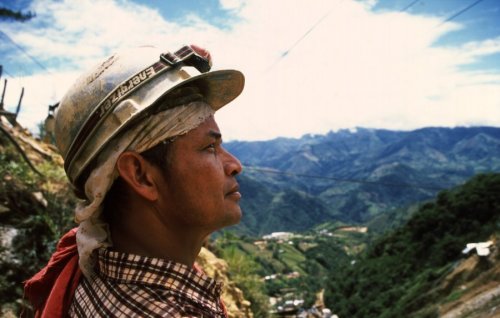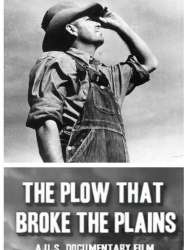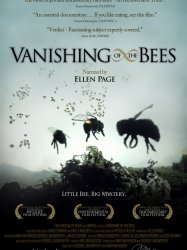Marmato is a film of genre Documentary released in USA on 17 january 2014
Marmato (2014)

If you like this film, let us know!
Released in USA 17 january 2014
Length 1h27
Genres Documentary
Themes Environmental films, Documentary films about business, Documentary films about environmental issues
Rating71%










Marmato is a 2014 American documentary film written, directed and produced by Mark Grieco. It is the debut feature film of Grieco. The film premiered in competition category of U.S. Documentary Competition program at the 2014 Sundance Film Festival on January 17, 2014, where it won the Candescent Award.
Synopsis
The film narrates 6-years long struggle of townspeople of Marmato, Caldas with Canadian mining company that wants the $20 billion in gold beneath their homes.Comments
Leave comment :
Suggestions of similar film to Marmato
There are 8968 with the same cinematographic genres, 1248 films with the same themes (including 93 films with the same 3 themes than Marmato), to have finally 70 suggestions of similar films.If you liked Marmato, you will probably like those similar films :

Fresh (2009)
, 1h12Origin USA
Genres Documentary
Themes Environmental films, Documentary films about business, Documentary films about environmental issues
Rating73%





Joanes sets out to profile people who are breaking away from conventional models of agriculture and food production. In the Shenandoah Valley of Virginia, Joel Salatin explains how he keeps his cows, chickens, pigs and natural grasses flourishing without using artificial fertilizers by closing the nutrient cycle. At Growing Power farm in Milwaukee, we meet Will Allen, who is turning three acres of industrial wasteland into nourishing farmland for his neighborhood. In Kansas City, David Ball breaks away from the standard concept of a supermarket by stocking his stores with produce from a cooperative of local farmers.
 , 25minutes
, 25minutesDirected by Pare Lorentz
Origin USA
Genres Documentary
Themes Environmental films, Documentary films about business, Documentary films about environmental issues
Actors Thomas Chalmers
Rating61%





 , 1h48
, 1h48Directed by Marie-Monique Robin
Origin France
Genres Documentary
Themes Environmental films, La mondialisation, Films about the labor movement, Documentary films about business, Documentaire sur l'altermondialisme, Documentary films about environmental issues, Documentaire sur le monde du travail
Rating79%





The film reports many controversies surrounding the use and promotion of genetically modified seeds, polychlorinated biphenyls (PCBs), Agent Orange, and bovine growth hormone. Cases in the United States (including Anniston, Alabama), Canada, India, Mexico, Paraguay, the United Kingdom (Scotland) and France, are explored, claiming that the Monsanto corporation's collusion with governments, pressure tactics, suppression and manipulation of scientific data, and extra-legal practices aided the company's attempts at dominating global agriculture. Scientists, representatives of the United States Food and Drug Administration and the United States Environmental Protection Agency, civil society representatives, victims of the company’s activities, lawyers, and politicians are interviewed.

Vanishing of the Bees (2009)
Origin United-kingdom
Genres Documentary
Themes Films about animals, Environmental films, Documentary films about business, Documentary films about environmental issues, Films about insects, Documentary films about nature
Actors Ellen Page, Emilia Fox
Rating70%





 , 1h28
, 1h28Origin USA
Genres Documentary
Themes Environmental films, Films about families, Documentary films about business, Documentary films about environmental issues, Documentaire sur une personnalité
Rating69%





 , 40minutes
, 40minutesOrigin USA
Genres Documentary
Themes Environmental films, Documentary films about business, Documentary films about environmental issues, Documentary films about historical events, Documentary films about technology, Disaster films
Rating57%






Queen of the Sun (2010)
, 1h23Origin USA
Genres Documentary
Themes Films about animals, Environmental films, Documentary films about business, Documentary films about environmental issues, Films about insects
Rating71%






Let It Be (2005)
Origin Taiwan
Genres Documentary
Themes Environmental films, Documentary films about business, Documentary films about environmental issues
Rating68%





This documentary records the lives of several old farmers (peasants) in Chheⁿ-liâu Village, Āu-piah (i.e., Houbi Township), Tainan County (now part of Tainan City). It generated discussion and debate in the Taiwanese civil society about the impact on agriculture due to its membership in the World Trade Organization.

Olives and Their Oil (1914)
Directed by Mack Sennett
Genres Documentary
Themes Environmental films, Documentary films about business, Documentary films about environmental issues

Bananas!* (2009)
, 1h27Directed by Fredrik Gertten
Genres Documentary
Themes Environmental films, Films about the labor movement, Documentary films about business, Documentary films about environmental issues, Documentaire sur le monde du travail
Rating68%





Au Nicaragua, les travailleurs paient un lourd tribut pour approvisionner le monde entier en bananes bon marché, et l'avocat Juan Dominguez compte bien les aider.
 Connection
Connection